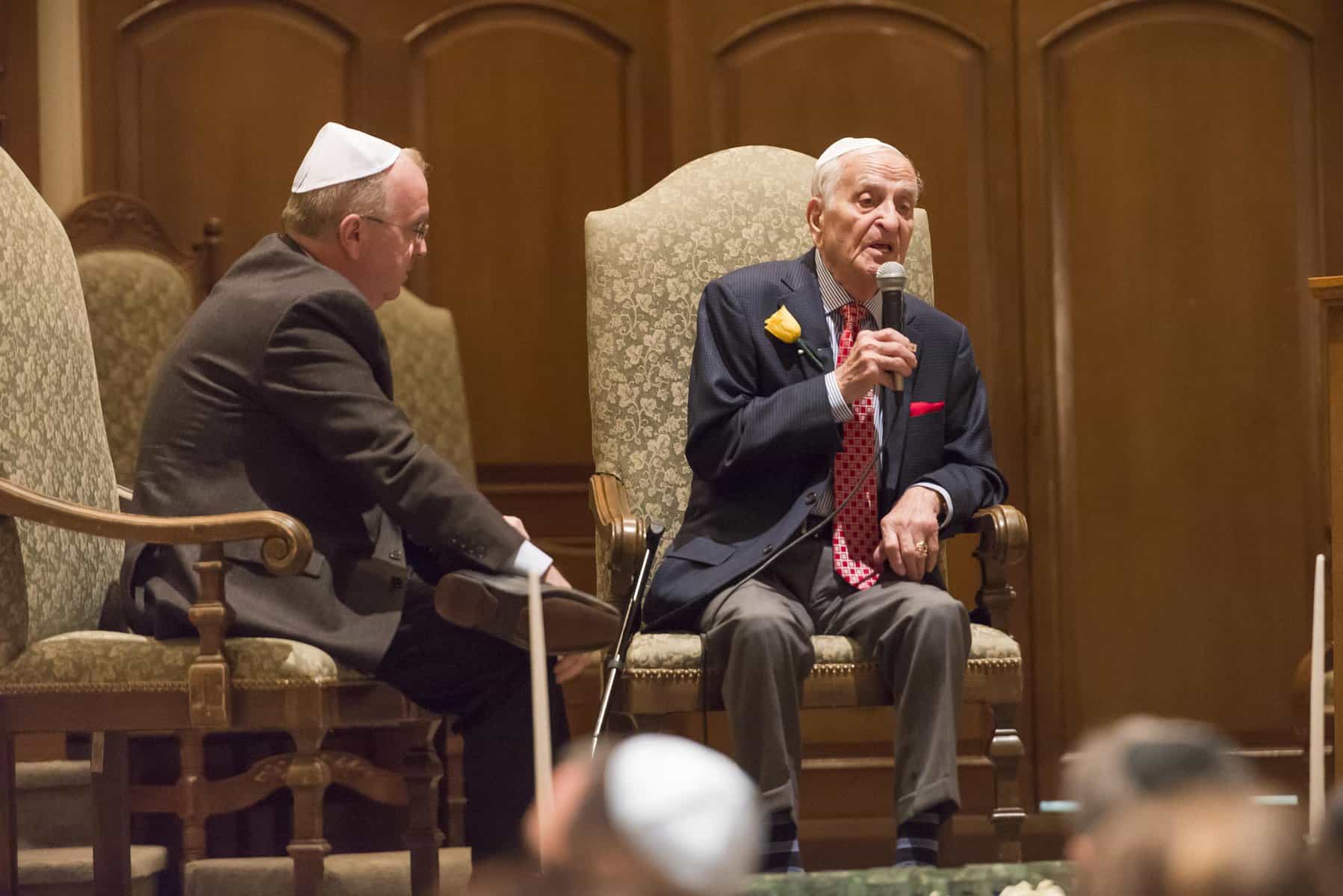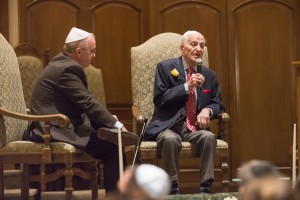If you were not one of the 500–600 people at Congregation Beth El for the annual Yom Hashoah program, sponsored by the Holocaust Commission of the United Jewish Federation of Tidewater, I wish I could say with confidence, “Don’t worry—there’s always next year.”
But I cannot.
The reality is that each year the survivor population decreases substantially. This means each year we must ask, “will we have the opportunity to honor them, to hear their stories live and in person?” The time is now—our days together are numbered.
Anne Diamonstein Fleder, chair of the Holocaust Commission, opened the program recognizing the 70th year since the end of WWII . While freedom was all the victims had hoped for, the anguish of liberation and the idea of returning to some sort of “normal,” left most survivors lost and alone.
Fleder quoted professor Dina Porat, chief historian at Yad Vashem: “The day of liberation, the one for which every Jew had longed throughout the years of the Holocaust, was for most a day of crisis and emptiness, a feeling of overwhelming loneliness as they grasped the sheer scale of the destruction on both the personal and communal level. Those who had survived, either in camps or in hiding, were in severely deteriorated physical condition and in a state of emotional shock.”
Turning to the voices of the future, the entries of more than 1,400 students to the 2015 Elie Wiesel Writing and Visual Arts Competitions were acknowledged. Poems, essays, two- and three- dimensional artworks and multimedia entries came from a record 46 public and private schools in Tidewater, as well as from Western Virginia, North Carolina, Washington, D.C., Maryland, South Carolina, Florida, New Jersey and Wisconsin. The entries were rendered anonymous and went through third party judging by highly qualified educators, writers and artists. Student winners were presented with a certificate of achievement, a cash award and a handblown glass Star of David paperweight, donated by local artist Matthew Fine with the cooperation of Ed Francis at TCC.
Jaden Baum, a 10th grade student at Norfolk Academy, won first place in this year’s Senior Division Poetry competion. She moved everyone to tears with her delivery of her extraordinary poem titled, When Enough Isn’t.
An excerpt: “The true tragedy lies in the fact that If we behave so flippantly After hearing the story of a true, real, Flesh and blood victim Of the consummate atrocity to which minorities were subjected, The scarce amount we care now Will become infinitesimally small Once they pass away. People ask why the message of the Holocaust Matters today and in the future. They inquire why these hard truths should be stressed to a highly repetitive degree. To them I reply History does indeed repeat itself if left alone. And I refuse to lay the grounds for a future genocide Simply because a high schooler wants to study for a quiz.”
Henry Greenbaum, the evening’s guest speaker, told his inspiring story of surviving the Holocaust. His son, Stanley, joined him, “talk-show style,” on the bima. At 87-years-old, Greenbaum gives the hour-long version of his story every Friday as a volunteer at the US Holocaust Memorial Museum in Washington D.C. At Yom Hashoah, his son helped guide him through the memories in an abridged report of the horrors, including losing his mother, five of his eight siblings, and living through a gunshot wound to his head before being deported to Auschwitz in 1944. He was liberated by American troops April 25, 1945. Greenbaum was only 11 years old when all he knew was taken away.
Less than a year ago, the elder Greenbaum took Stanley and his two brothers to his hometown and to Auschwitz. It was the first time he had set foot on that ground since his liberation. Stanley remembered how striking it was to see color in everything, a sharp contrast to the black and white images associated with the Holocaust. He also said, “After visiting Auschwitz and Flossenberg concentration camps with my father this past summer, and actually seeing where the horrors took place, I realize he is stronger than I could ever have imagined. He is my HERO.”
In Tidewater, Greenbaum also spoke to hundreds of students at both Norfolk Academy and Tallwood High School. As Greenbaum spoke, one young boy’s eyes got wider and wider. He was listening to what life had been like before the war. “I was just a regular kid, with regular friends,” said the octogenarian before them. “I went to school and kicked a soccer ball around for fun… I was just like you.”
I don’t think that boy blinked for the entire hour. I know I didn’t. Perhaps until Greenbaum described the day of his liberation when I blinked away tears: “The guards who had been making us march for hours suddenly left us by the edge of the forest and ran away. A huge tank pulled up in front of all of us. The lid popped open, and we didn’t know who they were at the time, but they turned out to be two beautiful American soldiers. ‘American Angels’ I call them. They put their hands up to their mouth and yelled, ‘You are Free!’” I looked up to the sky and said, ‘Thank you G-d that I am free, but why did it take you so long?’”
The Holocaust Commission works diligently to document and preserve the stories of our survivors, so that we may never forget, but nothing will replace hearing it from them first hand. As Alex Konikoff, seventh grader at Norfolk Academy, unequivocally said, “He was amazing! It was so interesting to hear what it was really like. I mean, we have read it in books and stuff but never heard from a real person.”
As the standing room only crowd at Tallwood High School left the auditorium after 75 minutes of rapt attention, 10 to 20 students approached Greenbaum with more questions. Within seconds, his left sleeve was rolled up to show them his tattoo from Auschwitz. Several students had tears in their eyes, and many could not leave without hugging him. “I am counting on you to be good to each other,” he told them. “We are all the same. White people, black people, brown people, green people. It doesn’t matter. Don’t let this happen again.”
Each year Yom Hashoah closes after a somber candle lighting ceremony, during which local survivors, liberators and Righteous Gentiles are honored. The number of survivors who light candles grows smaller each year, as that population grows older. This year it seemed there were more people lighting in memory of survivors who had passed away in the last year than actual survivors, and the trend will continue. As Greenbaum said, “Remember the survivors, because we’re not going to be around too long.” It is up to all of us to keep not only their memories, but also their stories and their lessons alive.
by Elyse Cardon


